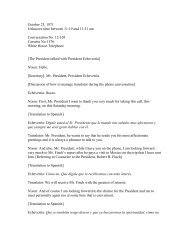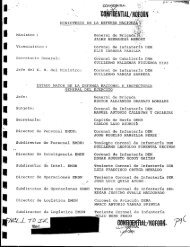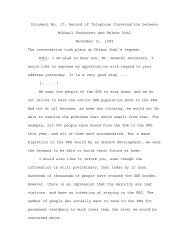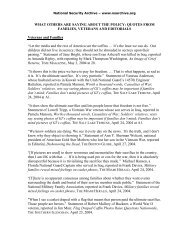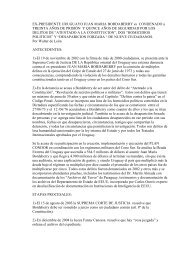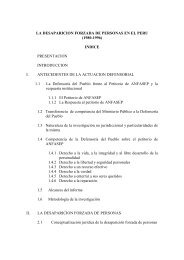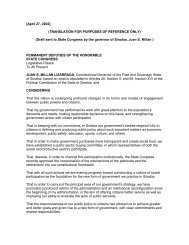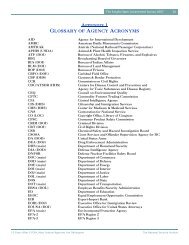TERRORISM 98 - FBI
TERRORISM 98 - FBI
TERRORISM 98 - FBI
You also want an ePaper? Increase the reach of your titles
YUMPU automatically turns print PDFs into web optimized ePapers that Google loves.
Acting under the authority of these laws and<br />
Presidential Decision Directive 39, the <strong>FBI</strong> exercises<br />
jurisdiction over extraterritorial terrorist acts when a<br />
U.S. national is a victim or perpetrator of the offense,<br />
the U.S. Government is the victim of the offense, or<br />
the perpetrator is later found in the United States.<br />
Since the mid-1<strong>98</strong>0s, the <strong>FBI</strong> has investigated more<br />
than 350 extraterritorial cases. Prior to conducting<br />
terrorism investigations outside U.S. borders, the <strong>FBI</strong><br />
secures permission from the host country and coordinates<br />
the investigation with the U.S. Department of<br />
State.<br />
More than 900 <strong>FBI</strong> Special Agents were sent<br />
overseas following the August 7, 19<strong>98</strong> bombings of<br />
the U.S. embassies in Nairobi, Kenya, and Dar es<br />
Salaam, Tanzania, which resulted in the deaths of 12<br />
Americans. This represented the largest overseas<br />
deployment in <strong>FBI</strong> history.<br />
The results achieved from the onsite<br />
presence of <strong>FBI</strong> Special Agents were<br />
immediate. Mohammed Rashed Daoud Al-<br />
Owhali and Mohammed Sadiq Odeh were<br />
arrested in Kenya on August 27 and 28,<br />
19<strong>98</strong>, respectively, and surrendered by<br />
Kenyan authorities to the United States to<br />
face charges arising from the embassy bombings.<br />
On September 17, 19<strong>98</strong>, Mamdouh<br />
Mahmud Salim was arrested in Germany<br />
and was later extradited to the United<br />
States to face similar charges arising from<br />
the twin bombings. This investigation further<br />
reinforced the belief that the cornerstone<br />
of successful international terrorism<br />
investigations is the ability to deploy federal<br />
law enforcement agents to the crime scene<br />
within hours of the incident.<br />
As the above examples demonstrate,<br />
extraterritorial jurisdiction also<br />
allows terrorist suspects to be indicted and<br />
tried in the United States for violation of<br />
federal statutes outlawing terrorist acts. In<br />
the 1990s, several high-profile international<br />
terrorists, including Ramzi Ahmed Yousef,<br />
Shaykh Omar Abdel Rahman, Omar<br />
Mohammad Ali Rezaq, and Tsutomu<br />
Shirosaki, were tried and convicted in the<br />
United States for acts of terrorism. The<br />
trend continued in 19<strong>98</strong> when on June 3 Mohammed<br />
Rashid was arrested overseas and brought to the<br />
United States to stand trial for the August 11, 1<strong>98</strong>2<br />
bombing of Pan Am Flight 830. The bombing resulted<br />
in the death of a Japanese youth and injury to several<br />
other passengers.<br />
The evolution of judicial and enforcement<br />
jurisdiction over the last two decades has effectively<br />
empowered the <strong>FBI</strong> to respond to terrorist attacks targeting<br />
U.S. nationals and interests outside the<br />
United States. Terrorism is a global phenomenon,<br />
and as such, the <strong>FBI</strong> is prepared to respond to terrorist<br />
acts on a global scale. Since extraterritorial<br />
authority was extended to the <strong>FBI</strong> in the mid-1<strong>98</strong>0s,<br />
the <strong>FBI</strong> has demonstrated that the ability to conduct<br />
on-site criminal investigations wherever terrorist<br />
strikes occur greatly enhances the likelihood that<br />
those responsible will be brought to justice.<br />
● NAIROBI, KENYA<br />
<strong>TERRORISM</strong> IN THE UNITED STATES 19<strong>98</strong><br />
16




